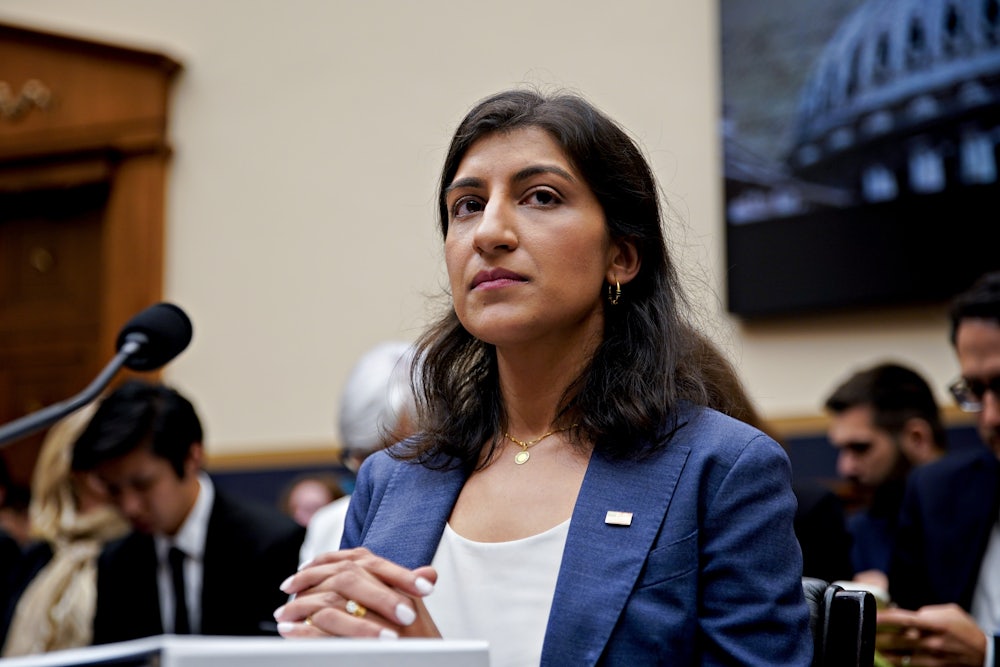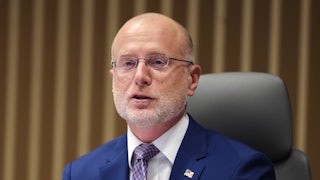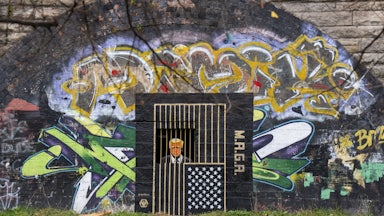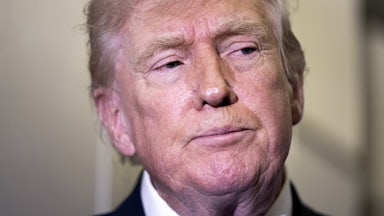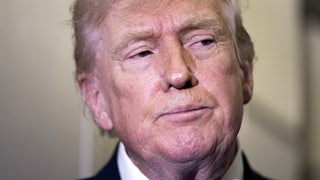Last week, the Federal Trade Commission issued a major new rule that would ban noncompete clauses for almost all American workers. The rule would be a major boost for millions of American workers, freeing them from unjust restrictions and weakening businesses’ power to constrain them. As a result, corporate interests have already filed lawsuits against the brand-new rule—and the Supreme Court’s conservative supermajority may well side with them.
“Noncompete clauses keep wages low, suppress new ideas, and rob the American economy of dynamism, including from the more than 8,500 new startups that would be created a year once noncompetes are banned,” Lina Khan, the chair of the FTC, said in a statement last week. “The FTC’s final rule to ban noncompetes will ensure Americans have the freedom to pursue a new job, start a new business, or bring a new idea to market.”
This rule is a juicy target for a Supreme Court that has recently sought to restrain what it describes as the “administrative state.” The court’s conservatives have used a variety of levers to strike down novel rules and regulations that it doesn’t like: an OSHA mandate for workplace Covid-19 testing, a Department of Education order to forgive billions of dollars in student debt, a defunct EPA plan for regulating power plants, and more.
The noncompete rule has wide-reaching implications on its own terms. The FTC estimated that roughly 30 million people, or about one-fifth of the American workforce, is currently bound by these agreements. They can be found at all levels of the economy, from senior corporate executives to growing numbers of blue-collar and service workers. It is the latter category that drew the most scrutiny from the commission.
The 570-page rule opens with testimony given by workers who’ve been harmed by noncompetes. One was a bartender who left their job after facing sexual harassment, then faced a $30,000 lawsuit when they got a new job. Another was a power washer who couldn’t start a new business because of the agreement they signed “out of duress” to previously keep their job. Yet another was a pediatrician who was let go by a hospital chain and then barred from continuing to treat her old patients afterwards.
Not every employer uses noncompete agreements in an abusive or coercive manner, of course. But their aggregate impact can be potent. The FTC estimated that the new rule will raise worker pay by an average of $524 per year, and, by encouraging new businesses and greater worker mobility, result in as many as 17,000 to 29,000 new patents each year.
Business groups have known that this rule would be coming since the FTC first proposed it in January after months of work. They struck quickly when it was announced. The first lawsuit was filed by Ryan, a tax services firm based in Dallas. The company is renowned for its aggressive efforts to lower tax burdens for companies and shift the laws in their favor; its namesake, G. Brint Ryan, is a major Trump donor. A second lawsuit filed the next day came from the U.S. Chamber of Commerce, which had vocally opposed the rule during the rulemaking process.
Until recently, both of these cases would be interpreted under the Chevron doctrine, which generally requires courts to defer to federal agencies on how to interpret ambiguous federal laws that outline their regulatory mandate. But conservative judges and legal scholars have long criticized Chevron for ceding too much power to the “administrative state.” The Supreme Court appears likely to overturn or at least substantially rewrite Chevron later this term, further empowering the judiciary to overturn federal rules and regulations.
Even before that, however, the Roberts Court had already carved large gaps into Chevron to allow itself to strike down regulations. The two lawsuits both attacked the noncompete rule on two of those fronts. First, they argued that the FTC lacked the statutory authority to draft the rule in the first place. They claimed that the FTC Act, which created the commission in 1914, had never been used in such a fashion before.
In this case, the FTC Act has two relevant parts. Section 5 generally prohibits “unfair or deceptive acts or practices in or affecting commerce.” Section 6(g) allows the commission to “make rules and regulations for the purpose of carrying out the provisions of this subchapter.” The firm and the chamber both argue that the agency cannot use these provisions to pass such a significant new rule thanks to a relatively new doctrine from the Supreme Court.
“The ‘major questions doctrine’ underscores that the Commission lacks the authority to ban non-competes by declaring them an unfair method of competition,” Ryan argued in its complaint. “The non-compete rule will invalidate 30 million employment contracts, directly affecting one-fifth of American workers and generating an economic impact of hundreds of billions of dollars. It upsets long-settled expectations.”
Invoking the major questions doctrine in this case is no surprise. The Supreme Court has expounded upon it in recent years to block disfavored rules and regulations, as well as anything that might be considered a novel interpretation of federal law. The classical formulation, from a 2014 case on the EPA’s power to regulate greenhouse gas emissions, is that the justices “expect Congress to speak clearly if it wishes to assign to an agency decisions of vast ‘economic and political significance.’”
As I’ve noted before, this approach can be a fraught one. What counts as “speaking clearly” by Congress? The court has not fully described the level of specificity that lawmakers must use to pass this test, and until recently lawmakers did not even know the test existed. What distinguishes a matter of “vast economic and political significance” from anything else? The United States is a very big and very rich country. It would be hard for lawmakers or regulators to do anything meaningful that did not affect a lot of people.
Many of these arguments were raised during the notice-and-comment process when the FTC drafted the rule, and it responded to them in the final product. First, it rejected the idea that what it was doing was a departure from historical norms. “This is thus not a situation where the agency’s action would fundamentally change the nature of the regulatory scheme,” the commission argued. “Determining whether a practice is an ‘unfair method of competition’ under section 5 has been a core task of the Commission for more than a century—and, indeed, goes to the heart of its mandate.”
Second, it also argued that Congress had already “spoken clearly” on the law in question. “None of the provisions on which the Commission is relying are either vague or ancillary,” the commission said. “As explained earlier, preventing unfair methods of competition is at the core of the Commission’s mandate, the plain text of the Act gives the Commission rulemaking authority to carry out that mandate, and the Commission has exercised this rulemaking authority before.”
Even if the courts conclude that the FTC has the statutory authority to issue the rule, then the parties switch to their backup argument: that Congress had no constitutional authority to draft such broad legislation in the first place. This is a reference to the nondelegation doctrine, a largely moribund principle of constitutional law.
“If the Commission were right that Section 5 empowers the Commission to declare an ordinary business practice unlawful notwithstanding the history, precedent, and economic evidence demonstrating the practice’s competitive benefits, then Section 5 would reflect a boundless and unconstitutional delegation of legislative power to the executive branch,” the Chamber of Commerce argued.
In its broadest terms, the nondelegation doctrine means that none of the three branches of government can delegate their constitutional authority to another branch of government. Congress, for example, cannot simply pass a law saying that the president can appoint whoever he wants to be an ambassador or a federal judge. The Senate must still vote to confirm each appointment on an individual basis.
Conservative legal scholars and some conservative justices have argued, however, for a more stringent version of the nondelegation doctrine. Under this approach, Congress cannot simply write laws that give federal agencies broad authority to regulate something, like clear air and water or safe drugs and medical devices. It must act more narrowly to avoid delegating its legislative authority to the legislative branch.
The most outspoken justice to advocate for this approach is Justice Neil Gorsuch. In the 2019 case Gundy v. United States, for example, he argued in dissent that Congress had violated the nondelegation doctrine by giving the attorney general the discretion to issue certain regulations for registered sex offenders. Justice Elena Kagan rejected that approach in her opinion for the court. “Indeed, if [this] delegation is unconstitutional, then most of government is unconstitutional,” she wrote.
The Supreme Court has not struck down a law on nondelegation grounds since the 1930s. To that end, the FTC argued in its final rule that its use of Section 5 was perfectly within the bounds of what Congress could do. It quoted from a Supreme Court ruling in 1989 that upheld broadly written legislation so long as Congress also identified an “intelligible principle” to limit the agency’s authority.
“Here, Congress ‘declared unlawful’ any ‘unfair methods of competition in or affecting commerce’ and ‘empowered and directed’ the Commission ‘to prevent’ entities within its jurisdiction ‘from using unfair methods of competition,’” the FTC explained. “Congress’s stated purpose and policy in section 5 provides the Commission with an intelligible principle to guide its section 6(g) rulemaking authority.”
The Federal Trade Commission has strong arguments for why its interpretation of law and precedent should prevail. The only question now is whether the courts will agree with them. Thanks to the major questions doctrine and the nondelegation doctrine, conservative judges have ample tools to discard novel regulatory efforts for vague and subjective reasons. As a result, for millions of American workers, the hope that they could freely ply their trades may turn out to be a short-lived one.
